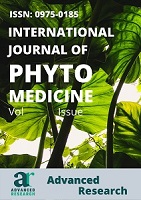Anticonvulsant activity of leaf extracts of Martynia annua linn in experimental rats
Keywords:
Martynia annua, Anticonvulsant activity, MES, PTZAbstract
Martynia annua Linn (Martyniaceae) is a medicinal herb used for the treatment of epilepsy in the traditional health care system of Uttarakhand (India). The present study reports the anticonvulsant activities in the ethanolic and aqueous extracts of the leaves of Martynia annua Linn on the rats, induced both chemically and electrically. The models chosen for the activity were Maximal Electroshock (MES) and Pentylenetetrazole (PTZ) induced convulsions in rats. The test dose studied were 200 and 400 mg/kg body weight orally of ethanolic and aqueous extracts of Martynia annua. Acute toxicity studies of the extract shows that the extract was non toxic up to the recommended dose 2000mg/kg body weight orally as per OECD guideline no 423. In PTZ induced seizures, onset of clonic convulsions were studied while in MES model reduction in mean duration of extensor phase was noted. Both aqueous and ethanolic extracts showed anticonvulsant activities against MES and PTZ animal models.
References
. Heinemann UE, Draghun E, Fickerer J,
Stabel and Zhang CL. Strategies for the
development of drugs for
pharmacological resistant epilepsies.
Epilepsia. 1994; 10-21.
. Raza MF, Shaheen MI, Choudhary A,
Suria AU, Rahman S, Sombati and
Delorenzo RJ. Anticonvulsant activities
of the FS 1 subfraction isolated from
roots of Delphinium denudatum.
Phytotherapy Research. 2001; 15: 426-
. Farnsworth NR. Ethno pharmacology and
drug development. In: Ethnobotany and
the search for new drugs. Foundation
symposium, Prance GT and J Marshal
(Eds). John Wiley and Sons: Chichester,
, 1994, 42-59.
. Balakrishnan N, Sanit K,
Balasubramanium A, Sangameswaran
B, Chaurey M. Antiepileptic activity of
Alangium salvifolium leaf extracts.
Herbal Tech Industry. 2010; 20-23.
. Loscher W, Schmidt D. Which animal
models should be used in the search for
new antiepileptic drugs? A proposal
based on experimental and clinical
consideration. Epilepsia Research.1988;
: 145-181.
. Kupferberg HJ. Antiepileptic drug
development program: a co-operative
effort of government and industry.
Epilepsia.1989; 30 (1): S 51- S56.
. Chopra RN, Nayar SL, Chopra IC.
Glossary of Indian medicinal plants.
National Institute of Science
Communication. New Delhi.1996.
. Satyavati GV, Gupta AK, Tandon N.
Medicinal plants of India.vol II. Indian
Council of medicinal research. New
Delhi. 1987.
. Sermakkani M, Thangapandian V.
Phytochemical and antibacterial activity
of M.annua L against different
pathogenic bacteria. J of herbal
medicine and toxicology. 2010; 4(2):
-224.
. Nagda D, Saluja A, Nagda C.
Antioxidant activities of methanolic and
aqueous extracts from leaves of M.
annua Linn. Pharmacognosy
Journal.2009; 1(4): 288-297.
. Khare CP. Indian Medicinal Plants an
illustrated dictionary. Springer
publications. 2007, 399-400.
. Kar DM, Nanda BK, Pradhan D, Sahu
SK, Dash GK. Analgesic and antipyretic
activity of fruits of M annua Linn.
Hamdard medicine. 2004; 47(1):32-35.
. Mali PC, Ansari AS, Chaturvedi M.
Antifertility effect of chronically
administered M.annua root extract on
male rats. J of ethnopharmacology.
; 82(2-3): 61-67.
. Nirmal SK, Nikalye AG, Jadav RS,
Tambe VD. Anthelmintic activity of
M.annua roots. Indian drugs. 2007;
(10):772-773.
. Harbone JP. Phytochemical methods, a
guide to modern technique of plant
analysis. Chapman and Hall, London.
1-271.
. OECD 2002. Acute oral toxicity. Acute
oral toxic class method guidelines 423
adopted 23.03.1996. In: Eleventh
Addendum to the OECD guidelines for
the testing of chemical organization for
economical co-operation and
development, Paris. June 2000.
. Hosseinzadeh H, Khosravan V.
Anticonvulsant effects of aqueous and
ethanolic extracts of Crocus sativus L
stigmas in mice. Arch International Med.
; 5:44-47.
. Sayyah M, Valizadeh J, Kamalinejad M.
Anticonvulsant activity of leaf essential
oils of Laurus mobilis against MES and
PTZ. Phytomedicine. 2002; 9: 212-216.
. Sonavane GS, Palekar RC, Kasture VS,
Kasture SB. Anticonvulsant and
behavioral actions of Myristica fragrans
seeds. Indian Journal of Pharmacology.
; 34: 332-338.
. Kulkarni SK. Experiment on intact
preparation :Pharmacology of CNS.
Handbook of experimental
pharmacology. 3rd edition. Mumbai:
Vallabh Prakashan. 1999; 131-134.



